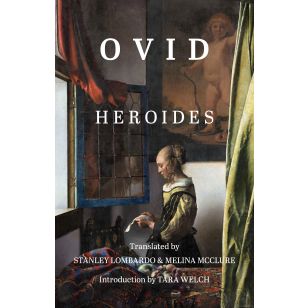Heroides
"An excellent piece of work. Lombardo and McClure have struck the right balance between literal and lyrical, formal and informal. Each of the letters has a distinct voice–something clear in the Latin but difficult to convey.
"There are many small pleasures for the reader looking at the Latin (duplicated line-starts and -ends, verbal effects, etc.). Most are unobtrusive, which is all to the good. This translation is not designed to be a crib, though it wouldn’t be bad as one. More importantly, the poems read well in English. There are lots of glancing references to the tropes of elegy, but they won’t slow down the first-time reader of the poems. The translators have even made something of several of the puns (e.g. verbum/vela dare), an impressive feat.
"Welch's Introduction is perfectly pitched; it gives a lot of useful information in short compass, and it does so in a lively manner, with full attention to the scholarship but not so as the general reader would notice."
–Laurel Fulkerson, Professor Emerita of Classics, Florida State University
"What would Greek and Roman myth look like if women had written the stories?" asks Tara Welch in her illuminating Introduction to this volume. Stanley Lombardo and Melina McClure’s faithful translation of Ovid's famous letters, purportedly written by heroines of classical antiquity to their absent lovers, offers an inkling of one intriguing possibility.
Reviews:
"An excellent piece of work. Lombardo and McClure have struck the right balance between literal and lyrical, formal and informal. Each of the letters has a distinct voice–something clear in the Latin but difficult to convey.
"There are many small pleasures for the reader looking at the Latin (duplicated line-starts and -ends, verbal effects, etc.). Most are unobtrusive, which is all to the good. This translation is not designed to be a crib, though it wouldn’t be bad as one. More importantly, the poems read well in English. There are lots of glancing references to the tropes of elegy, but they won’t slow down the first-time reader of the poems. The translators have even made something of several of the puns (e.g. verbum/vela dare), an impressive feat.
"Welch's Introduction is perfectly pitched; it gives a lot of useful information in short compass, and it does so in a lively manner, with full attention to the scholarship but not so as the general reader would notice."
–Laurel Fulkerson, Professor Emerita of Classics, Florida State University
"There is a clear need for this volume. Its new translation offers language that is more up-to-date than Isbell, the revised Loeb by Goold, and other translations available. The language used by Lombardo and McClure is full of verve and passion yet doesn’t try to be overly colloquial.
"Welch's Introduction covers a lot of ground, and I found myself learning or re-learning things about the epistles that will nicely inform my (or any instructor's) presentation of these letters to students, whether they be high school or college students."
–Teresa Ramsby, Professor of Classics, University of Massachusetts Amherst
About the Authors:
Stanley Lombardo is Professor Emeritus of Classics, University of Kansas.
Melina McClure is a graduate student in Classics at the University of Oxford.
Tara Welch is Professor of Classics, University of Kansas.














